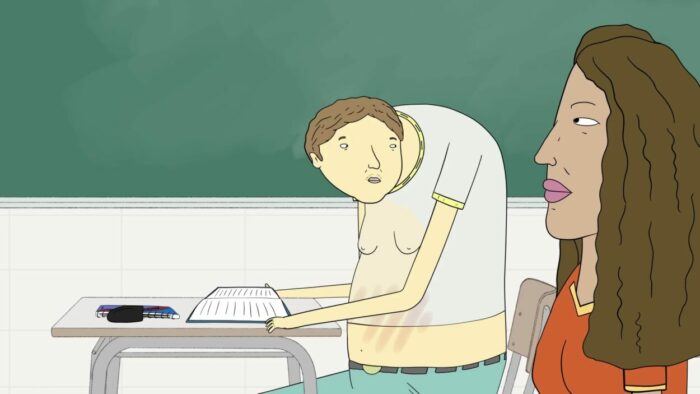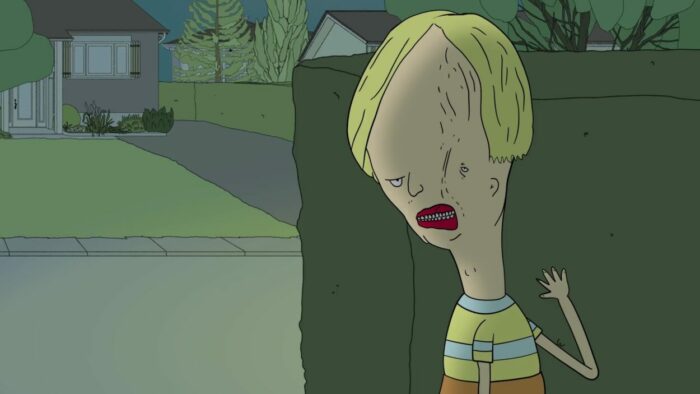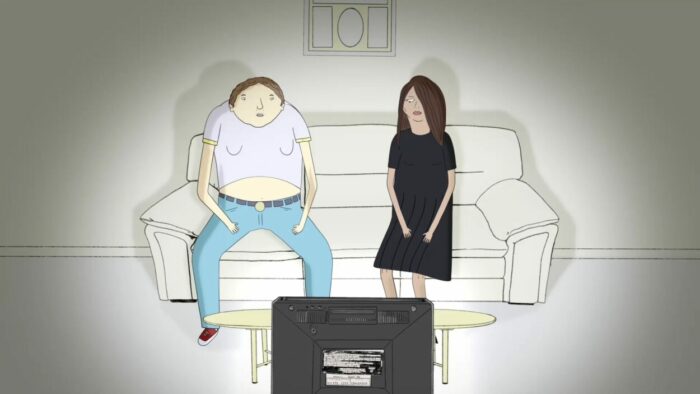By turns sadly bleak and glibly funny, the animated film When Adam Changes might just break your heart. A tale of a stoop-shouldered young boy in 1990s Quebec, the festival hit from writer-director Joël Vaudreuil and co-producers David Pierrat and Olivier Picard manages deft timing and memorable visuals in its depiction of a single, sad summer, one in which its hero, so to speak, comes of age. Adam is tall and overweight with impossibly poor posture, his head falling forward over his neck like a lead weight of social shame. A change is all too welcome: everywhere he turns, it seems, he faces bullying and derision, and worse, his body constantly betrays him, spastically erupting at moments of stress in response to the shaming he’s forced to endure.

In the first five minutes of the film, poor Adam is verbally abused by his grandmother, who even with her dying breath is disparaging his long torso and weird voice, a harangue she’s been practicing for years; then at school he is bullied by the mullet-headed Glazer, who slaps his belly raw and smothers it with oil, marking him a pig for being a little portly. Humiliated, Adam lumbers through the last day at school enduring the snickers and stares of others, buoyed only by the support of his sympathetic best friend Tim.
Having a best friend allows Adam at least a little humanity. That and watching action films on VHS on his small bedroom tv, hoping to emulate his hero’s exploits, are about all that give Adam reason to make it through each day. There is also his crush, Jeanne, a freckly, popular girl with whom he almost, just almost shares the teeny-tiniest bit of rapport—that is, before her boyfriend Glazer appears to knock the stuffing out of Adam once again.
The prospect of summer looks no brighter. Adam is consigned to housesitting at a posh relative’s home, replete with a stellar gaming console, a sweet stash of comics, and even a private pool. But snippy Kevin, the owner’s privileged son, tells Adam it’s all off limits. It’s a double interdiction of sorts: Adam is first warned by Glazer away from Jeanne and then by Kevin away from the pool. See where that’s going?
Meanwhile, summer vacation brings Adam little more than another series of painful indignities. His sister, more popular than he, barely tolerates him. In another episode of his body betraying him, Adam accidentally maims a local boy, Pierrot, who takes to mysteriously dragging a long lead pipe through the neighborhood. A gig mowing his creepy English teacher’s lawn is equally humiliating. Aside from poring through Kevin’s comics (including a hidden porn stash that further arouses Adam’s yen for Jeanne) and pondering the neighborhood mysteries, like his English teacher’s habit of slinging his dog’s bagged poo into the tree branches, Adam’s summer simply sucks.

When Adam Changes unfolds at a leisurely pace. Adam moves and talks slowly, and the film follows his lead, letting shots and scenes play out to their conclusion and often just a bit beyond, a strategy that creates a bit of intentional discomfort. The film’s two-dimensional, sparsely-shaded backgrounds are predominantly static; interiors are rendered a bit like computer-drawn home design programs; and movement, aside from the characters’ expressions and gestures and occasional, spasmodic bursts of action, is rare. Even the fight sequences in Adam’s favorite action films are shot with a comically flat mise-en-scene, a little like stop-motion with paper cutouts.
It’s an approach that works perfectly, conveying the stultifying claustrophobia of Adam’s existence, a summer in the doldrums with only occasional glimmers of hope. The two-dimensional style emphasizing the characters’—and especially Adam’s—less attractive physical features reminds a bit of Beavis and Butthead, though the characters in When Adam Changes are far more complex and engaging than are those two simpletons. Nicolas Moussette’s hand-drawn animations may appear simplistic at first, but in certain scenes, like Adam’s dancing alone with a pillow as he watches a romance on his tiny tv, dreaming of kissing Jeanne, are rendered with a stylistic complexity that contrasts strongly with his more mundane everyday experience.
The film’s title and the double interdiction of the narrative (don’t approach Jeanne and don’t use the pool) bring the simmering set of conflicts to an unlikely climax involving a wild party, a growth spurt, a quadriplegic cat, and a fight sequence, one that will have you cheering on poor Adam. His isn’t any traditional quest but just a yearning to be normal, to enjoy his friends and his summer, to converse with and maybe kiss a girl, and to go through life generally unscathed. It’s not too much to ask.

Unique and clever, with plenty of mild giggles and modest insights into male adolescence, When Adam Changes knows its subject perfectly well. Bullied, beleaguered, and betrayed, its protagonist needs a break. Too bad none of the Glazers of the world are likely to see a film like this and learn a bit from it. They’d be be a bit better off imbued with some of the empathy When Adam Changes engenders.




Thank you very much for this superb criticism!